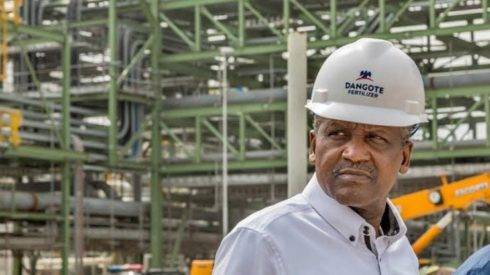Alhaji Aliko Dangote, the Chairman of Dangote Group, outlined a promising prospect for Nigeria’s economy through reduced fuel prices. Dangote highlighted the imminent impact of the fully operational Dangote Petroleum Refinery, particularly in curbing the nation’s persistent inflation woes. He emphasized that the refinery’s provision of diesel at significantly lower prices would contribute to mitigating inflationary pressures.
Alhaji Aliko Dangote articulated, “There’s quite a lot of improvement because if you look at it here, one of the major issues that we’ve had was the narrow devaluation that has gone very aggressively up to about N1,900. But right now we’re back to almost N1,250 or N1,300, which is a good improvement.” This sentiment underscores the potential for the refinery to stabilize currency fluctuations, a critical factor in controlling inflation.
Furthermore, Alhaji Aliko Dangote elucidated the cascading effect of high diesel prices on consumer goods, noting, “Even people now when you go to the market, for example, something that we produce locally, like flour or whatever, people will charge you more.” By offering diesel at a reduced rate, the refinery aims to alleviate the financial burden on producers, subsequently leading to lower prices for locally manufactured goods, thus benefiting consumers.
Impact on Transportation and Local Production
Alhaji Aliko Dangote’s projection extends beyond mere speculation, as he outlined tangible benefits for the transportation sector and local production. He explained, “Because if you are transporting locally produced goods, rice and other stuff, you are paying N1,650. Now you are paying two-thirds of that amount, N1,200. It’s a lot. It’s a lot of difference.” This reduction in transportation costs directly translates to lower operational expenses for businesses, fostering a conducive environment for economic growth and competitiveness.
Moreover, the prospect of decreased fuel prices aligns with broader efforts to bolster local production and reduce dependency on imported goods. Dangote emphasized the role of the refinery in supporting domestic industries, stating, “That can actually help to bring inflation down immediately.” By empowering local producers with affordable energy resources, the refinery catalyzes a sustainable shift towards self-sufficiency, thereby fortifying Nigeria’s economic resilience against external shocks.
Alhaji Aliko Dangote call for Collaborative Efforts Towards Economic Stability
Alhaji Aliko Dangote’s optimistic outlook is complemented by a call for collaborative action from both the private and public sectors. He expressed confidence in the government’s commitment to enhancing economic conditions, asserting, “So one step at a time. And I’m sure the government is working round the clock to make sure that things get much better.” This synergy between government initiatives and private sector investments underscores a unified approach towards achieving economic stability and prosperity for all stakeholders.
Alhaji Aliko Dangote’s vision for leveraging decreased fuel prices from the Dangote Petroleum Refinery emerges as a beacon of hope amidst Nigeria’s economic challenges. With a strategic focus on alleviating inflationary pressures, stimulating local production, and fostering collaborative efforts, Dangote presents a compelling narrative for sustainable economic relief and growth. As stakeholders await the fruition of these endeavors, the prospect of a brighter economic future beckons, propelled by innovation, resilience, and collective action.
Dangote Refinery: A Beacon of Economic Resilience
Alhaji Aliko Dangote’s assertion regarding the impact of the Dangote Petroleum Refinery signals a promising development in Nigeria’s quest to mitigate inflationary pressures. As the largest single-train refinery in the world, the facility’s operationalization promises a substantial increase in domestic refining capacity. This surge in production is poised to translate into tangible benefits for consumers, particularly through the significant reduction in diesel prices.
By offering diesel at more affordable rates, the refinery aims to curtail the inflationary ripple effects that often burden consumers and businesses alike. Furthermore, Alhaji Aliko Dangote’s emphasis on the need for a competitive market underscores the refinery’s broader objective of fostering economic resilience. Through healthy market competition, the likelihood of exploitative tendencies is mitigated, thereby promoting fair pricing practices and bolstering consumer welfare.
Regulatory Imperatives: Ensuring Fair Play in the Petroleum Sector
Alhaji Aliko Dangote’s call for strengthened regulatory institutions underscores the indispensable role of governance in ensuring equitable participation within the petroleum sector. With the impending operationalization of the Dangote Petroleum Refinery and the proliferation of other modular and private refineries, effective regulatory oversight becomes paramount. Regulatory bodies must be empowered to enforce compliance and uphold industry standards, thereby fostering a level playing field for all stakeholders. Additionally, stringent regulatory frameworks serve as a bulwark against exploitative practices, safeguarding the interests of both consumers and industry players. As Nigeria navigates the transition towards a more competitive petroleum market, the onus lies on governmental authorities to fortify regulatory mechanisms and engender an environment conducive to sustainable economic growth.
By emphasizing the transformative potential of the Dangote Petroleum Refinery and advocating for regulatory fortification, Alhaji Aliko Dangote elucidates a pathway towards addressing Nigeria’s inflation concerns. As the country braces itself for the refinery’s operationalization, concerted efforts must be undertaken to ensure that regulatory frameworks are robust and inclusive. Through collaborative action between public and private entities, Nigeria can harness the full potential of its petroleum sector to foster economic prosperity and alleviate inflationary pressures.
Table of Contents
Discover more from OGM News NG
Subscribe to get the latest posts sent to your email.













